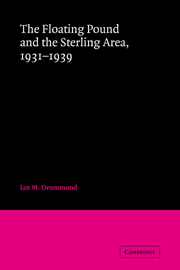Book contents
- Frontmatter
- Contents
- Preface
- 1 Introduction: the sterling area in the 1930s
- 2 Sterling and the rupee
- 3 The Canadian debate over money and exchanges, 1930–1934
- 4 South Africa, sterling, and the gold standard, 1931 and thereafter
- 5 Australia and New Zealand, 1930–1939
- 6 Monetary preparations for the World Economic Conference
- 7 United Kingdom policy at the World Monetary and Economic Conference
- 8 Talking about exchange stabilization, autumn 1933 through June 1936
- 9 The Tripartite Agreement of 1936
- 10 Intergovernmental conversations and the management of sterling, 1936–1939
- 11 Conclusion: the significance of sterling
- Notes
- Index
10 - Intergovernmental conversations and the management of sterling, 1936–1939
Published online by Cambridge University Press: 07 October 2011
- Frontmatter
- Contents
- Preface
- 1 Introduction: the sterling area in the 1930s
- 2 Sterling and the rupee
- 3 The Canadian debate over money and exchanges, 1930–1934
- 4 South Africa, sterling, and the gold standard, 1931 and thereafter
- 5 Australia and New Zealand, 1930–1939
- 6 Monetary preparations for the World Economic Conference
- 7 United Kingdom policy at the World Monetary and Economic Conference
- 8 Talking about exchange stabilization, autumn 1933 through June 1936
- 9 The Tripartite Agreement of 1936
- 10 Intergovernmental conversations and the management of sterling, 1936–1939
- 11 Conclusion: the significance of sterling
- Notes
- Index
Summary
The Tripartite Agreement brought a shadow of international monetary cooperation but not its substance. Admittedly, in the day-to-day management of the exchanges there was regular contact between the central banks of Britain, France, and the United States. Admittedly, too, in principle the British and American treasuries now stood rather nearer to one another and to the French than they had done before. From Washington, Morgenthau loved to send cables, and he rejoiced in the transatlantic telephone, a device that London still treated with suspicion. Emmanuel Monick still perambulated the English-speaking world to interpret the most recent developments in Paris – usually some what after they had occurred. T. K. Bewley in Washington, Ernest Rowe-Dutton in Paris, and W. W. Butterworth in London all had more work than before. Although the Bank for International Settlements has not left many traces in the Treasury records of the late thirties, perhaps in addition there were new sorts of contact at Basel. But none of this made any fundamental difference. I have argued elsewhere that with respect to the management of the franc after September 1936 there was little tripartite consultation and less cooperation, although London certainly gave advice and help to Paris while Washington agonized. Most of the time Paris simply did what it wanted, telling London and Washington after the fact. As far as France was concerned the tripartite understanding remained in existence only because Britain and the United States were prepared to ignore the way in which France ignored it.
- Type
- Chapter
- Information
- The Floating Pound and the Sterling Area1931–1939, pp. 223 - 251Publisher: Cambridge University PressPrint publication year: 1981



